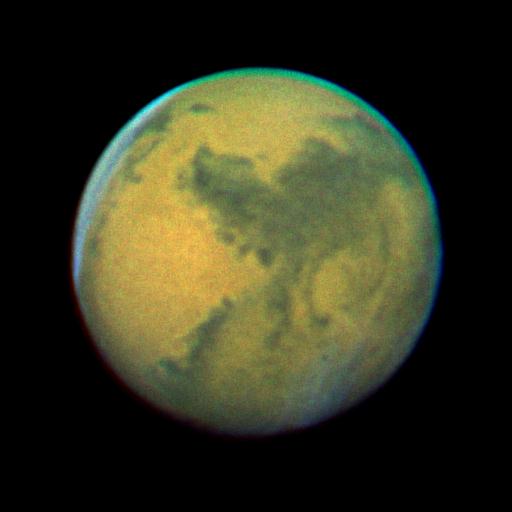Venus, Mars Share Rare Molecule |

Venus, Mars Share Rare Molecule |
 Oct 11 2007, 07:33 AM Oct 11 2007, 07:33 AM
Post
#1
|
|
|
Member    Group: Members Posts: 247 Joined: 17-February 07 From: ESAC, cerca Madrid, Spain. Member No.: 1743 |
Planetary scientists have detected a rare molecule in the atmospheres of both Mars and Venus. The molecule, an exotic form of carbon dioxide, could affect the way the greenhouse mechanism works on Venus.
More information is available at the ESA Venus Express web site at: http://www.esa.int/SPECIALS/Venus_Express/SEMF8BV7D7F_0.html -------------------- --
cndwrld@yahoo.com |
|
|
|
 |
 Oct 11 2007, 05:09 PM Oct 11 2007, 05:09 PM
Post
#2
|
|
 Senior Member     Group: Members Posts: 3419 Joined: 9-February 04 From: Minneapolis, MN, USA Member No.: 15 |
Unfortunately, Nick, Venus' mass is very nearly exactly that of Earth -- close enough that I wouldn't expect to see any statistical differences in atmospheric gasses related to escape velocity.
When I look at Venus, Mars and the Earth, and ask myself what atmospheric condition is shared by the former two and not by the latter, the only thing that comes to mind is direct interaction between the atmosphere and the solar wind. Earth's magnetic field wards off the direct solar wind, but Venus and Mars both endure direct impact of the solar wind into their upper atmospheres. This continual "spalling" of the atmosphere is what has supposedly accounted for the reduction in Mars' atmosphere to such a pitiful remnant at this point in geological time. If Venus has been sans magnetic field for most of its history, you'd have to think it's regenerating its air a lot more robustly than Mars ever could. But, in any event -- could this unusual concentration of rare isotopes be the result of high-energy interactions between the solar wind and the upper atmosphere? The only other thing I can imagine that would account for it would be differentiation in the solar nebula -- but for that to be the case, you'd have to have a relative abundance of certain isotopes and a "desert" of such isotopes in the band of the nebula from which Earth accreted. Occam's Razor would suggest we're looking at a post-accretion effect and not a question of solar nebula composition. -the other Doug -------------------- “The trouble ain't that there is too many fools, but that the lightning ain't distributed right.” -Mark Twain
|
|
|
|
 cndwrld Venus, Mars Share Rare Molecule Oct 11 2007, 07:33 AM
cndwrld Venus, Mars Share Rare Molecule Oct 11 2007, 07:33 AM
 ngunn Thanks for posting that. The word 'isotopologu... Oct 11 2007, 03:46 PM
ngunn Thanks for posting that. The word 'isotopologu... Oct 11 2007, 03:46 PM

 tuvas QUOTE (ngunn @ Oct 11 2007, 08:46 AM) Tha... Oct 12 2007, 01:42 PM
tuvas QUOTE (ngunn @ Oct 11 2007, 08:46 AM) Tha... Oct 12 2007, 01:42 PM
 stevesliva Sounds a lot like the discovery of Helium. Oct 11 2007, 03:56 PM
stevesliva Sounds a lot like the discovery of Helium. Oct 11 2007, 03:56 PM

 ngunn QUOTE (stevesliva @ Oct 11 2007, 04:56 PM... Oct 11 2007, 04:08 PM
ngunn QUOTE (stevesliva @ Oct 11 2007, 04:56 PM... Oct 11 2007, 04:08 PM
 nprev Hmm. According to this site, O-18 only makes up 0.... Oct 11 2007, 04:49 PM
nprev Hmm. According to this site, O-18 only makes up 0.... Oct 11 2007, 04:49 PM

 ngunn QUOTE (nprev @ Oct 11 2007, 05:49 PM) Hmm... Oct 11 2007, 08:01 PM
ngunn QUOTE (nprev @ Oct 11 2007, 05:49 PM) Hmm... Oct 11 2007, 08:01 PM
 nprev I was thinking of accretional effects too, Doug, b... Oct 11 2007, 06:22 PM
nprev I was thinking of accretional effects too, Doug, b... Oct 11 2007, 06:22 PM
 nprev Okay, I'm with you now...funny how assumptions... Oct 11 2007, 09:12 PM
nprev Okay, I'm with you now...funny how assumptions... Oct 11 2007, 09:12 PM

 ngunn QUOTE (nprev @ Oct 11 2007, 10:12 PM) So ... Oct 11 2007, 09:22 PM
ngunn QUOTE (nprev @ Oct 11 2007, 10:12 PM) So ... Oct 11 2007, 09:22 PM
 ngunn Nice clarification, thanks tuvas. Oct 12 2007, 02:10 PM
ngunn Nice clarification, thanks tuvas. Oct 12 2007, 02:10 PM  |

|
Lo-Fi Version | Time is now: 4th June 2024 - 04:50 AM |
|
RULES AND GUIDELINES Please read the Forum Rules and Guidelines before posting. IMAGE COPYRIGHT |
OPINIONS AND MODERATION Opinions expressed on UnmannedSpaceflight.com are those of the individual posters and do not necessarily reflect the opinions of UnmannedSpaceflight.com or The Planetary Society. The all-volunteer UnmannedSpaceflight.com moderation team is wholly independent of The Planetary Society. The Planetary Society has no influence over decisions made by the UnmannedSpaceflight.com moderators. |
SUPPORT THE FORUM Unmannedspaceflight.com is funded by the Planetary Society. Please consider supporting our work and many other projects by donating to the Society or becoming a member. |

|